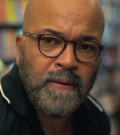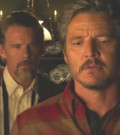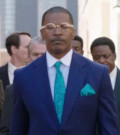By Sean Plummer
 It may or may not be surprising to learn that director Paul Thomas Anderson (Magnolia, Boogie Nights) has a different parenting style than his The Master star Amy Adams. The point comes up obliquely during a recent Toronto International Film Festival press conference that Adams and the press-shy Anderson recently attended to promote Anderson’s controversial new film The Master.
It may or may not be surprising to learn that director Paul Thomas Anderson (Magnolia, Boogie Nights) has a different parenting style than his The Master star Amy Adams. The point comes up obliquely during a recent Toronto International Film Festival press conference that Adams and the press-shy Anderson recently attended to promote Anderson’s controversial new film The Master.
“I just kind of keep TCM on at my house like 24 hours a day, like all of us do,” Anderson says by way of explaining his film influences. “I kind of put it on in the kitchen and it’s always on so even if I'm not watching anything I kind of let it soak into my veins and hopefully wash over you and do something good. Like that.”
“I have Sprout on about 24 hours a day so it’s a different influence,” Adams adds to much laughter.
“I force my children to watch TCM. I hold their heads up,” says Anderson.
Adams: “See I force my daughter to watch The Wiggles.”
Anderson: “You should try TCM.”
Adams: “Yeah, she would love it.”
The Master is Anderson’s long-awaited follow-up to 2007’s There Will Be Blood. After a much-publicized hiatus from acting, Joaquin Phoenix returns to feature filmmaking to play Freddie Quell, an unsettled navy veteran searching for meaning in his life when World War II ends. Freddie thinks he has found that meaning when he meets Lancaster Dodd (Philip Seymour Hoffman: Magnolia), the charismatic leader of a Scientology-styled movement called The Cause. Adams plays Dodd’s Lady Macbeth-style wife Peggy.
The primary source of the controversy surrounding The Master is The Cause’s alleged parallels to Scientology, a topic one reporter brings up right away by asking Anderson about what it was like to write about a cult.
“I just want to tell you that I don’t consider that we are dealing with a cult,” Anderson says. “The area of this story after the war is like food and drink to me, in terms of an opportunity for a lot of good stuff to tell a story. We talked about it before. There’s a mix of a tremendous amount of optimism but an incredibly large body count behind you, and how can you feel really great about being victorious about something but with so much death around you? It kind of gets you to a spot where you’ve got to figure out where all the bodies go, and that kind of creates a situation where people want to talk about past lives and they want to talk about what happens after you die.
“And those sorts of ideas that the masters are putting forward is that time travel is possible; accessing things that have happened to you in another life is possible. Those are great ideas, I think, and they’re hopeful ideas, the kind of stuff that was interesting to me to write this story around.”
Given the powerhouse nature of the cast – Hoffman has been nominated for three Oscars, winning one; Phoenix has been nominated twice; Adams, three times – Anderson is asked about how he was able to direct Hoffman and Phoenix, who share many scenes together, “without it becoming a scenery chew-off between them.”
“It isn’t? F**k,” Anderson says with a smirk. “I know what you mean though. I think perhaps, to give them both a compliment, they are really strong hitters but they are also team-players. I think maybe the mistake of a young actor is to dominate something, but the sweet spot of a mature or maturing actor is one who really gives over and knows when to squeeze in and knows when to slow down, and ultimately they think that is more fun for everybody when you find a way to play together that services everything else, as opposed to a kind of d**k-measuring contest.”
Tags:
amy adams, paul thomas anderson, the master, tiff, TIFF2012







Comments: